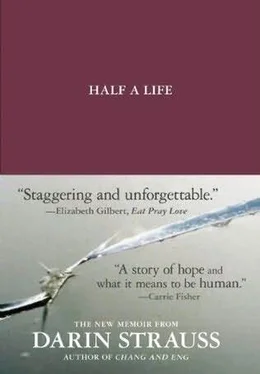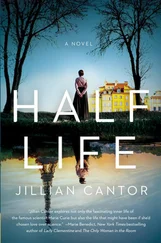About two weeks later, I graduated and left town. 2
I saw college as a type of witness-protection program. I was so eager for the fresh identity, I’d get sweaty thinking about it. Everyone in my high school knew. No one at Tufts did, and while I was there they never would.
But I did make one important stop in town before I left: Celine Zilke’s parents’ house. At the funeral, they’d invited me to “come by whenever,” so I thought I owed them a visit. I thought they expected this, even wanted it. How I thought about Celine was in large part still governed by conformity, by appearances: if I didn’t know exactly how I was , I could at least control how I seemed , and seeming was where all benefit lay.
I went to the Zilkes’ alone. I actually imagined a cozy welcome. They’d smile, maybe touch my cheek, we’d cry together.
I knocked. And when I knocked — when my bunched hand hit Celine’s real door — I realized this may have been a mistake. My stomach shuddered up toward my throat. Maybe nobody’s home? I leaned an ear to the wood, made out the clumps and risings of voices. After a courage-building swallow, I knocked again. One man’s voice got louder and more distinct, coming closer. The door opened. It was Celine Zilke’s father.
After seeing me, Mr. Zilke turned back to the room: “Oh, look who it is.” I had a good view of the back of his head. “It’s Darin.” He said this as if he was proud I’d showed. As if he’d that very instant been defending me.
“He’s here to say how sorry he is,” he told the room — really grinding the knuckle of his emotion into the words. “To apol ogize.” This was a few days after the funeral.
“Hello,” I said, smiling in a queasy way.
It was afternoon, and there were five or six other people around, collected in the Zilkes’ den — family members, fellow grievers, people I didn’t know. Pressing into the room (and it felt like a programmed momentum that carried me, not the normal mechanics of foot and leg) had the spooky feel of straining against a gravitational force. Everyone kept their mouths shut with such fervor they seemed lipless. There was the smell of stale coffee. Was I here to apologize? The Zilkes had said at the funeral that they knew it wasn’t my fault, hadn’t they? Did they somehow miss the Newsday article? I had the abrupt-swerve, waking-nightmare sense that I’d gotten it wrong, that I’d imagined the newspaper entirely.
Mr. Zilke guided me to the couch. His hand, when I shook it, had a really human clamminess. Then he left for the kitchen, came back, offered me a tall iced tea. He put a coaster down.
“How are you?” I said, stupidly.
“Okay,” he said. “Yes. You know.”
“Good,” I said — taking a very long sip and swallowing before finally lowering my glass to the coaster. Then that was finished.
Mr. Zilke could not keep focused on me. The quiet now was that kind where the only sounds are domestic ones: a far-off refrigerator, acorns clanking onto a drainpipe. Nobody moved. My arrival had strained this place; you could still feel a twang in the air. The thing Mr. Zilke could keep focused on stood behind my iced-tea glass — a picture of Celine in a shiny frame.
The visit was a promise kept too soon, a handshake attempted in the dark and made with the wrong person. They didn’t want me here and I didn’t want to be here. After a few more minutes, Mr. Zilke shepherded me to the door.
Under the lintel, he rested an almost narcotized stare on me — tilting his face, squeezing his lip with two fingers — as if sussing out a faint noise in the house, a neighboring yard, a far-off country.
“No matter what,” he said finally, “we would never blame you, Darin.”
Past his shoulder, I watched the other guests exchange Well, that’s that looks. I drifted back to my car with the cold sensation of a type of social death — the small certainty you get on a few occasions in your life, when a parting has no assurance of a return. I would never, I was sure, see the Zilkes again.
Five months later, I learned that Celine’s parents were suing me for millions of dollars.
2. Before that, though — before graduation, the prom. I’d been set to take a girl from another town. She and I’d been orbiting each other like nervous rabbits, but hadn’t made it even to the make-out stage. Now, though, after the accident transpired — after my name appeared in the newspaper — it was over. I hadn’t thought she’d have even heard about the crash. Wrong. “I’m not going to go with you anymore,” she said, hurriedly removing herself from me and this book. I was pretty intent, all the same, on showing my face at prom. (“The accident hasn’t wrecked me totally; the accident hasn’t wrecked me totally …”) Smiles can be little contentment generators: when you pretend to feel a few clicks better than you really are, you actually get some small upturn in your mood. That’s what I’d been hoping, anyway. And I caught a break: my sweet and lovely date from last year’s junior prom was, improbably, still free for this one, too. She was kind enough to go with me. And so I went to the prom. The end.
“An accident isn’t necessarily ever over.”
— Diane Williams
At college, I spent a lot of my first year with physics and psychology books, gulping down studies and figures. I took solace in math: you’re doing forty, and the girl with the bicycle cuts ten feet in front of you — impact will arrive in something like 700 milliseconds. Human perception time — not only to see a hazard, but to understand one as such — is generally accepted to saw off some 220 milliseconds. Next, the mostly neural job of getting foot to brake demanded another 500 milliseconds. It seemed I was exculpated by 20 milliseconds.
These numbers I sought in the library. There was a pattern: sometimes when I sat bucketed in an easy chair, or studied coursework in my lap, I’d tell myself it was time for a washroom break or something. But then I’d find myself in the physical-science stacks, my fingers tapping over books, making sure that my reassuring numbers were still there, that they were still reassuring.
It was always the same, even before I knew I was being sued. It took about forty minutes and then I would end up on my feet — placemarking my textbook, leaving it in the cushions, and shambling off. One time I passed a friend who was going through microfiche — the old whir of newspapers, the blue of ink and gray flashing in front of her head — and I began to tear up, out of panic. Because the library was double-edged. It had my relief in it and my guilt: my physics numbers in the upstairs collections, and, down by periodicals, the record of me and Celine. Had my friend found out, was she searching for me in a Long Island tabloid?
I still didn’t know that legal threats were gathering, attempts at authorized ruin, cold winds from home. Regardless, I was thinking about Celine as often as ever. I internalized my cares about conventionality and appearances.
The moments before the crash became a kind of VHS tape, over-rented, overplayed, stripped: the colors scratched away, the sound wobbly — until I didn’t try to remember at all, and the tape would burst into high-def vividness. Hair, bicycle, reflector. I’d be doing something mundane, like removing a soda from an icy case at the Mini Mart. And while my fingers closed around the damp, solid aluminum, I would think: Celine Zilke will never feel a can in her grip again . I was also muddling through the soundstage brightness of occasional flashback. I’d rush to class, take a corner, look at some kids hackey-sacking on the quad and see the gross anatomy of a bicycle lying in the street. Or Celine’s glassy face.
Читать дальше









